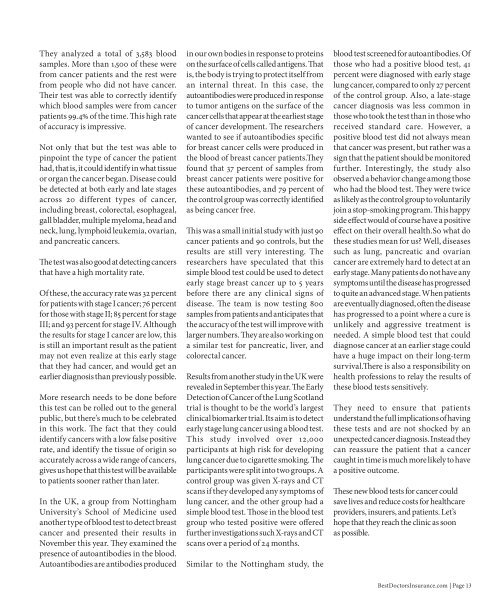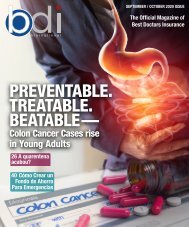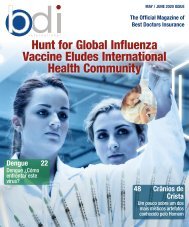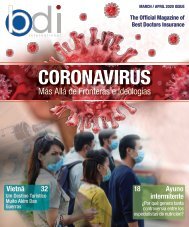BDI-International Magazine - Inaugural Issue
Best Doctors Insurance magazine
Best Doctors Insurance magazine
Create successful ePaper yourself
Turn your PDF publications into a flip-book with our unique Google optimized e-Paper software.
They analyzed a total of 3,583 blood<br />
samples. More than 1,500 of these were<br />
from cancer patients and the rest were<br />
from people who did not have cancer.<br />
Their test was able to correctly identify<br />
which blood samples were from cancer<br />
patients 99.4% of the time. This high rate<br />
of accuracy is impressive.<br />
Not only that but the test was able to<br />
pinpoint the type of cancer the patient<br />
had, that is, it could identify in what tissue<br />
or organ the cancer began. Disease could<br />
be detected at both early and late stages<br />
across 20 different types of cancer,<br />
including breast, colorectal, esophageal,<br />
gall bladder, multiple myeloma, head and<br />
neck, lung, lymphoid leukemia, ovarian,<br />
and pancreatic cancers.<br />
The test was also good at detecting cancers<br />
that have a high mortality rate.<br />
Of these, the accuracy rate was 32 percent<br />
for patients with stage I cancer; 76 percent<br />
for those with stage II; 85 percent for stage<br />
III; and 93 percent for stage IV. Although<br />
the results for stage I cancer are low, this<br />
is still an important result as the patient<br />
may not even realize at this early stage<br />
that they had cancer, and would get an<br />
earlier diagnosis than previously possible.<br />
More research needs to be done before<br />
this test can be rolled out to the general<br />
public, but there’s much to be celebrated<br />
in this work. The fact that they could<br />
identify cancers with a low false positive<br />
rate, and identify the tissue of origin so<br />
accurately across a wide range of cancers,<br />
gives us hope that this test will be available<br />
to patients sooner rather than later.<br />
In the UK, a group from Nottingham<br />
University’s School of Medicine used<br />
another type of blood test to detect breast<br />
cancer and presented their results in<br />
November this year. They examined the<br />
presence of autoantibodies in the blood.<br />
Autoantibodies are antibodies produced<br />
in our own bodies in response to proteins<br />
on the surface of cells called antigens. That<br />
is, the body is trying to protect itself from<br />
an internal threat. In this case, the<br />
autoantibodies were produced in response<br />
to tumor antigens on the surface of the<br />
cancer cells that appear at the earliest stage<br />
of cancer development. The researchers<br />
wanted to see if autoantibodies specific<br />
for breast cancer cells were produced in<br />
the blood of breast cancer patients.They<br />
found that 37 percent of samples from<br />
breast cancer patients were positive for<br />
these autoantibodies, and 79 percent of<br />
the control group was correctly identified<br />
as being cancer free.<br />
This was a small initial study with just 90<br />
cancer patients and 90 controls, but the<br />
results are still very interesting. The<br />
researchers have speculated that this<br />
simple blood test could be used to detect<br />
early stage breast cancer up to 5 years<br />
before there are any clinical signs of<br />
disease. The team is now testing 800<br />
samples from patients and anticipates that<br />
the accuracy of the test will improve with<br />
larger numbers. They are also working on<br />
a similar test for pancreatic, liver, and<br />
colorectal cancer.<br />
Results from another study in the UK were<br />
revealed in September this year. The Early<br />
Detection of Cancer of the Lung Scotland<br />
trial is thought to be the world’s largest<br />
clinical biomarker trial. Its aim is to detect<br />
early stage lung cancer using a blood test.<br />
This study involved over 12,000<br />
participants at high risk for developing<br />
lung cancer due to cigarette smoking. The<br />
participants were split into two groups. A<br />
control group was given X-rays and CT<br />
scans if they developed any symptoms of<br />
lung cancer, and the other group had a<br />
simple blood test. Those in the blood test<br />
group who tested positive were offered<br />
further investigations such X-rays and CT<br />
scans over a period of 24 months.<br />
Similar to the Nottingham study, the<br />
blood test screened for autoantibodies. Of<br />
those who had a positive blood test, 41<br />
percent were diagnosed with early stage<br />
lung cancer, compared to only 27 percent<br />
of the control group. Also, a late-stage<br />
cancer diagnosis was less common in<br />
those who took the test than in those who<br />
received standard care. However, a<br />
positive blood test did not always mean<br />
that cancer was present, but rather was a<br />
sign that the patient should be monitored<br />
further. Interestingly, the study also<br />
observed a behavior change among those<br />
who had the blood test. They were twice<br />
as likely as the control group to voluntarily<br />
join a stop-smoking program. This happy<br />
side effect would of course have a positive<br />
effect on their overall health.So what do<br />
these studies mean for us? Well, diseases<br />
such as lung, pancreatic and ovarian<br />
cancer are extremely hard to detect at an<br />
early stage. Many patients do not have any<br />
symptoms until the disease has progressed<br />
to quite an advanced stage. When patients<br />
are eventually diagnosed, often the disease<br />
has progressed to a point where a cure is<br />
unlikely and aggressive treatment is<br />
needed. A simple blood test that could<br />
diagnose cancer at an earlier stage could<br />
have a huge impact on their long-term<br />
survival.There is also a responsibility on<br />
health professions to relay the results of<br />
these blood tests sensitively.<br />
They need to ensure that patients<br />
understand the full implications of having<br />
these tests and are not shocked by an<br />
unexpected cancer diagnosis. Instead they<br />
can reassure the patient that a cancer<br />
caught in time is much more likely to have<br />
a positive outcome.<br />
These new blood tests for cancer could<br />
save lives and reduce costs for healthcare<br />
providers, insurers, and patients. Let’s<br />
hope that they reach the clinic as soon<br />
as possible.<br />
BestDoctorsInsurance.com | Page 13
















